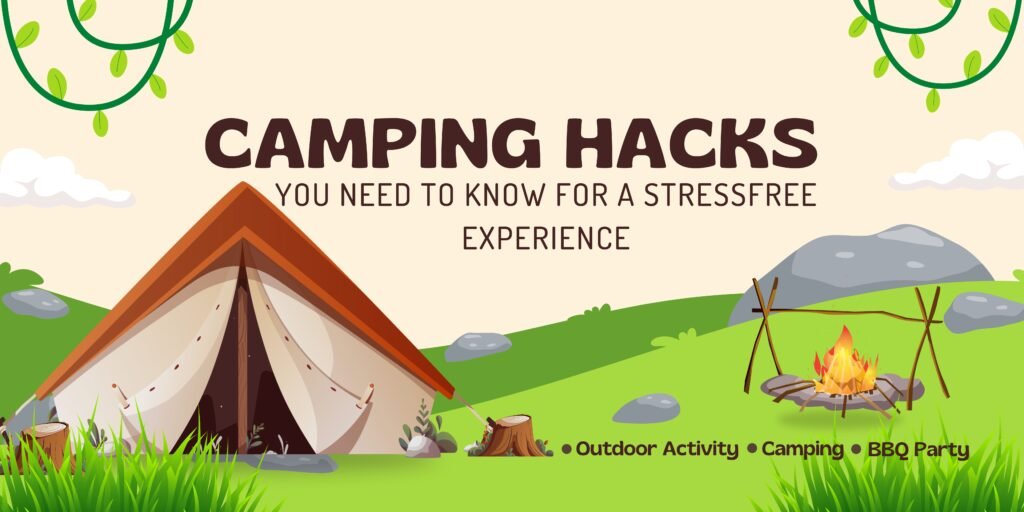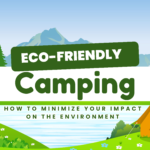Camping is an excellent way to disconnect from the daily grind and immerse yourself in nature. However, without proper preparation, what should be a relaxing adventure can quickly turn into a stressful ordeal. Whether you’re a seasoned outdoor enthusiast or a first-time camper, having the right hacks up your sleeve can make all the difference. This guide will cover the best camping hacks for a stress-free experience, offering detailed, expert-level information to help you make the most out of your outdoor adventure.
1. Plan Your Trip Thoroughly
A successful camping trip starts with meticulous planning. Begin by selecting a destination that matches your skill level and desired experience. Consider factors such as the weather, terrain, and amenities available. Some campsites require reservations, so it’s essential to book early to avoid disappointment.
Key Tips:
- Check the Weather: Always check the weather forecast before your trip and prepare for unexpected changes. Pack layers, waterproof clothing, and gear accordingly.
- Create a Checklist: A comprehensive checklist ensures you don’t forget any essentials, from tents and sleeping bags to cooking gear and first aid supplies.
- Know the Rules: Familiarize yourself with the rules and regulations of your chosen campsite. Some areas have specific guidelines for campfires, waste disposal, and wildlife protection.
2. Master the Art of Efficient Packing
Packing efficiently is a crucial camping skill. Overpacking can lead to unnecessary weight, while underpacking might leave you missing vital gear. Focus on bringing multi-purpose items to save space and weight.
Key Tips:
- Use a Packing System: Organize gear by category (e.g., sleeping gear, cooking equipment, clothing) and store each category in separate bags. This makes finding what you need quick and easy.
- Roll, Don’t Fold: Rolling your clothes not only saves space but also prevents wrinkles.
- Pack Lightweight, Compact Gear: Opt for lightweight and compact gear like collapsible cooking sets, inflatable pillows, and microfiber towels.
3. Choose the Perfect Campsite
The right campsite can set the tone for your entire trip. When selecting a spot, consider safety, comfort, and convenience.
Key Tips:
- Look for Flat Ground: A flat area is ideal for setting up your tent, ensuring a comfortable sleeping surface.
- Check for Hazards: Avoid setting up camp under dead trees or near water bodies that may flood.
- Sunlight and Shade Balance: Choose a site that offers both sunlight and shade, allowing you to stay cool during the day and warm at night.
4. Set Up Your Tent Like a Pro
Pitching a tent may seem straightforward, but there are techniques to make it more secure and comfortable.
Key Tips:
- Practice at Home: Familiarize yourself with your tent setup at home to avoid frustration at the campsite.
- Use a Ground Tarp: A ground tarp under your tent provides extra insulation and protects the tent floor from damage and moisture.
- Anchor Against the Wind: Stake your tent down securely and use guylines to prevent it from collapsing in windy conditions.
5. Stay Organized with a Camp Kitchen
A well-organized camp kitchen makes meal prep easier and more enjoyable. It can also help you keep your campsite clean, minimizing wildlife encounters.
Key Tips:
- Use a Hanging Organizer: A hanging shoe organizer can store utensils, spices, and other kitchen essentials.
- Prep Meals Ahead of Time: Chop veggies, marinate meats, and pre-cook grains at home. Store them in reusable bags for easy cooking.
- Bring a Collapsible Sink: A collapsible sink allows for easy dishwashing and water collection without taking up too much space.
6. Keep Food Safe from Wildlife
Food storage is critical in preventing wildlife encounters. Proper storage ensures your safety and that of the animals.
Key Tips:
- Use Bear Canisters: In areas known for bear activity, use bear canisters or bear bags to store food.
- Hang Food High: When bear canisters aren’t required, hang food bags at least 10 feet off the ground and 4 feet from the nearest tree.
- Seal Food Properly: Use airtight containers or resealable bags to minimize food odors.
7. Make Fire Starting a Breeze
Starting a campfire can be challenging, especially in damp conditions. Having the right fire-starting tools and knowledge can make the process quick and stress-free.
Key Tips:
- Pack Fire Starters: Cotton balls soaked in petroleum jelly, dryer lint, or commercial fire starters are lightweight and highly effective.
- Use a Fire Pit: If your campsite has a designated fire pit, use it. This contains the fire and reduces the risk of it spreading.
- Know the Leave No Trace Principles: When extinguishing your fire, follow the “Leave No Trace” guidelines by dousing it with water and stirring until cool.
8. Stay Warm and Cozy
Temperatures can drop significantly at night, even in summer. Being prepared with the right gear will ensure you stay warm and comfortable.
Key Tips:
- Invest in a Quality Sleeping Bag: Choose a sleeping bag rated for the lowest temperatures you might encounter. Sleeping bag liners can add extra warmth.
- Wear a Beanie to Bed: A beanie helps retain body heat, keeping you warm through the night.
- Use a Sleeping Pad: A good sleeping pad provides insulation from the cold ground and adds comfort.
9. Repel Bugs Naturally
Nothing ruins a camping trip faster than swarms of mosquitoes or other biting insects. Natural repellents can keep bugs at bay without the harsh chemicals.
Key Tips:
- Burn Sage in Your Campfire: Sage is a natural mosquito repellent. Toss a bundle into the campfire to keep bugs away.
- DIY Bug Spray: Make your own bug spray using essential oils like citronella, eucalyptus, and lavender.
- Mosquito Netting: Use mosquito netting over sleeping areas and dining spaces for added protection.
10. Be Ready for Rainy Days
Unexpected rain can be a major hassle, but being prepared can turn a soggy situation into an adventure.
Key Tips:
- Bring a Tarp: A tarp can create a rain shelter for your cooking and socializing area.
- Pack Quick-Dry Clothing: Quick-dry clothing minimizes discomfort and reduces the risk of hypothermia.
- Create a Clothesline: String up a rope between trees to hang wet clothes and gear for drying.
11. Stay Hydrated and Nourished
Proper hydration and nutrition are essential for maintaining energy and enjoying your camping trip. Dehydration can sneak up on you, especially during strenuous hikes.
Key Tips:
- Use a Portable Water Filter: A portable water filter or purification tablets ensure you have access to clean drinking water at all times.
- Bring High-Energy Snacks: Trail mix, jerky, and energy bars provide quick energy boosts.
- Plan Easy-to-Cook Meals: Plan meals that require minimal preparation and cleanup, like one-pot dishes or foil-wrapped meals cooked over the fire.
12. Leave No Trace
Respect the environment by following the Leave No Trace principles. Leaving a clean campsite preserves the natural beauty and ensures it’s enjoyable for others.
Key Tips:
- Pack Out All Trash: Bring reusable bags for collecting trash and recyclables.
- Minimize Campfire Impact: Use established fire rings and keep fires small.
- Respect Wildlife: Observe animals from a distance and never feed them.
Conclusion
A stress-free camping experience is all about preparation, organization, and having the right hacks up your sleeve. By planning ahead, packing efficiently, and utilizing these expert camping hacks, you’ll be well-prepared for any situation that comes your way. Remember, the key to a successful camping trip is to enjoy nature responsibly while creating unforgettable memories. Happy camping!
Additional Resources
For more expert tips on camping gear, outdoor cooking, and survival skills, be sure to check out our other articles:
- [Ultimate Guide to Choosing the Right Camping Gear]
- [Top 10 Campfire Recipes That Will Make You the Hero of the Campground]
- [Survival Skills Every Camper Should Know]
By incorporating these insights into your next camping trip, you’ll be better prepared to handle any challenges and fully embrace the joys of the great outdoors.



